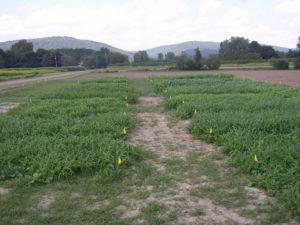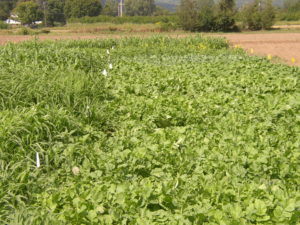The New York State Workgroup for Improved Soil Health
One definition of soil health is the continued capacity of soil to function as a vital living ecosystem that sustains plants, animals, and humans. This definition speaks to the importance of managing soils so they are sustainable for future generations. To do this, we need to remember that soil isn’t an inert growing medium, but rather is a living ecosystem. Physically and biologically degraded or unhealthy soils are typically found in systems with continuous tillage, low crop residues, and low diversity. Soils with poor 
To maintain or build a healthy soil, agriculture systems need to reduce tillage to an extent which maintains maximum crop residue cover. The system should increase diversity and maintain living roots throughout the growing season through diverse crop rotations including winter annuals, perennials and cover crops. The system should integrate properly managed livestock systems and the use of organic amendments where feasible.
Following these principles will improve soil structure and increase organic matter, improving soil health and function over time. Increasing both active and stable organic matter, improves water holding capacity, increases aeration capacity and increases nutrient holding capacity and cycling. Additional related benefits include: reduce weather-related risks, improved water quality, minimizing runoff and flooding, improved tractability on crop fields, reduced compaction and the potential to improve profitability over time.

Upcoming events include two workshops at the USDA-NRCS Big Flats Plant Materials Center in Big Flats, NY on October 16th for small scale vegetable producers featuring speakers from Cornell University on cover crops and reduced tillage for more information go to: http://tinyurl.com/SoilHealthOct16 and a workshop on cover crops and reduced tillage for field crop and large scale vegetable producers on November 6th featuring speakers from Cornell, Penn State and the University of Vermont, for more information go to: http://tinyurl.com/SoilHealthNov6.
For more information about the Soil Health Workgroup and the upcoming events contact Paul Salon USDA-NRCS (607) 562-8404, paul.salon@ny.usda.gov. For complete soil health testing information go to: Cornell Soil Health Program http://soilhealth.cals.cornell.edu/.

